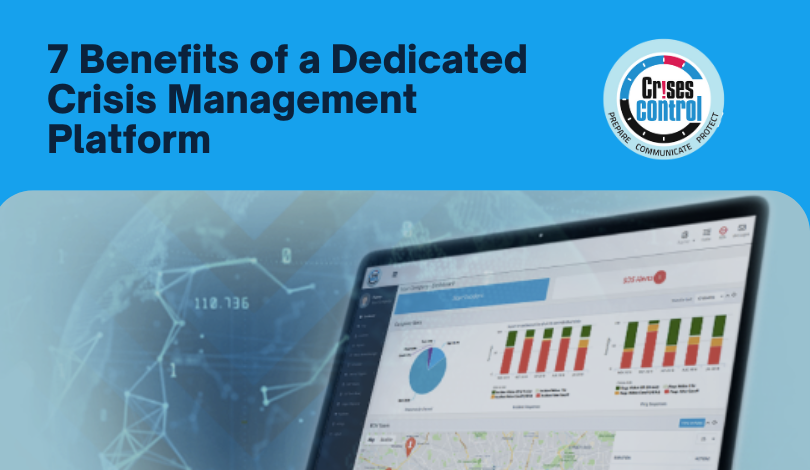Organisations face numerous challenges that can disrupt their operations and reputation. Crises, whether they are natural disasters, cybersecurity incidents, or public relations emergencies, can have severe consequences if not handled effectively. To mitigate these risks and ensure business continuity, companies are increasingly turning to crisis management platforms. In this blog, we will explore the numerous benefits of adopting a crisis management platform like Crises Control and how it can empower organisations to navigate through challenging times successfully.
1. Streamlining Crisis Response and Communication
A crisis management platform provides a centralised hub for coordinating and executing crisis response activities. With features such as mass notification, organisations can rapidly disseminate critical information to employees, stakeholders, and relevant parties. The platform enables targeted messaging, ensuring that the right information reaches the right people at the right time. By streamlining communication during crises, companies can minimise confusion, enhance situational awareness, and expedite decision-making processes.
2. Efficient Incident Reporting and Documentation
An effective crisis management platform facilitates real-time incident reporting and documentation. Through intuitive interfaces and mobile applications, employees can easily report incidents as they occur, providing essential details and context. This streamlined approach not only ensures prompt action but also creates a comprehensive incident log for future reference and analysis. By capturing crucial data during crises, organisations can identify patterns, assess the effectiveness of response strategies, and implement improvements for future incidents.
3. Collaborative Crisis Planning and Preparedness
A crisis management platform enables organisations to develop comprehensive crisis response plans and protocols collaboratively. With functionalities like task assignment, teams can work together to create contingency plans, define roles and responsibilities, and establish clear escalation paths. These platforms often offer customizable templates, ensuring that organisations can tailor their crisis management framework to their specific needs. By fostering collaboration and preparedness, companies can respond swiftly and effectively when a crisis arises.
4. Real-Time Monitoring and Situational Awareness
During a crisis, accurate and up-to-date information is vital for effective decision-making. A crisis management platform provides real-time monitoring capabilities, allowing organisations to gather and analyse data from various sources. Whether it’s social media feeds, news updates, or internal reports, these platforms aggregate information and present it in a meaningful way. By maintaining situational awareness, organisations can proactively respond to evolving crises, identify emerging risks, and make informed decisions promptly.
5. Enhanced Business Continuity and Resilience
Implementing a crisis management platform significantly enhances an organisation’s ability to ensure business continuity and resilience. By having a structured and well-defined crisis management framework in place, companies can minimise downtime, reduce financial losses, and protect their reputation. These platforms enable organisations to recover swiftly from crises, mitigate potential damages, and resume operations with minimal disruption. By safeguarding their business continuity, companies can maintain customer trust and loyalty even during challenging times.
6. Centralised Data and Document Management
A crisis management platform acts as a central repository for critical data, documents, and resources. From crisis response plans to contact lists and incident reports, all essential information is securely stored and easily accessible. This centralised approach eliminates the need for scattered documentation and ensures that stakeholders can quickly retrieve the information they need during crises. With instant access to relevant data and resources, organisations can make informed decisions, communicate effectively, and mitigate risks more efficiently.
7. Continuous Improvement and Learning
One of the significant advantages of a crisis management platform is the ability to learn from past incidents and improve response strategies continuously. These platforms often offer post-incident analysis tools, allowing organisations to assess their performance, identify gaps, and implement corrective measures. By conducting thorough reviews and incorporating lessons learned, companies can enhance their crisis management capabilities over time. This continuous improvement mindset strengthens the organisation’s resilience and equips them to handle future crises effectively.
Conclusion
In today’s volatile business environment, organisations must proactively manage and mitigate crises to protect their operations, stakeholders, and reputation. Adopting a crisis management platform such as Crises Control empowers companies to navigate through uncertain times with confidence. By streamlining crisis response and communication, facilitating collaborative planning, and providing real-time monitoring, these platforms enhance business continuity and resilience. Furthermore, the centralised data management and continuous improvement features ensure that organisations can learn from past incidents and strengthen their crisis management capabilities. To experience the benefits of Crises Control and fortify your organization against crises, request a live demo or get in touch with our experts today.








